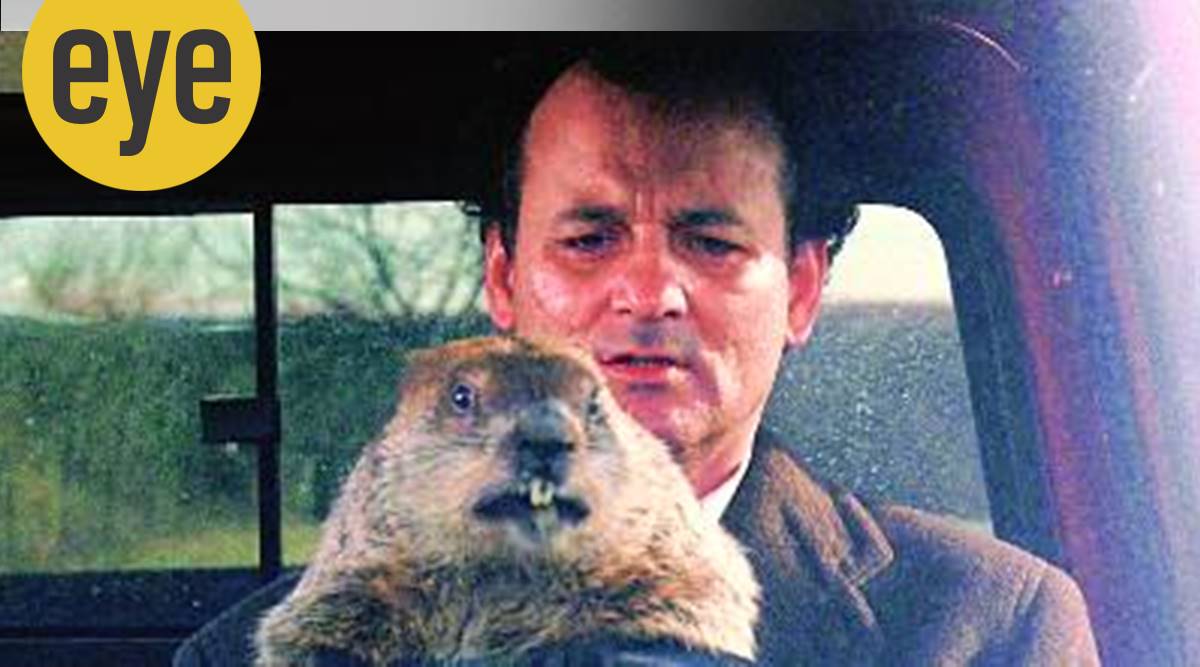 A scene from Groundhog Day
A scene from Groundhog Day What would you do if you were shut in one place, and all your days were the same, and nothing you did mattered? Were you forced to ask yourself this, or some version of this, during the lockdown? Of course, you were. As the virus raged, we stayed in, and our days turned into a jumble of dreary sameness. If we were lucky enough to be alive, that is.
That’s the question which looms over Phil Connors (Bill Murray), egocentric weatherman at a TV channel, in Groundhog Day (1993, currently streaming on MUBI India). He is in Punxsutawney, a small town which glories in a quaint annual tradition involving, yes, a groundhog. He’s bored. Of the hick town, its smiley folks, the event. All he wants is to leave as fast as he can. But that ain’t happening. Uh-huh. He is stuck, in that town, reliving the same day over and over again. And again.
We see Phil waking up in his hotel room at the same time (5.59 ticking over to 6.00 on the bedside alarm clock), the same song and the same banter on the radio. He meets the same portly guy on the top of the steps. He is greeted by the same friendly lady at the coffee counter. He sees the same homeless old man on the street corner. He is hailed by the same cheery insurance agent. He splashes into the same icy puddle, as he heads towards the crowd around the groundhog where his crew — producer Rita (Andie MacDowell) and cameraman Larry (Chris Elliott) — are waiting for him. And so on.
Now Phil is the kind of very-pleased-with-himself guy who believes he’s far more famous than he actually is. He doesn’t smile. Smirking is his preferred expression. Nice is not his middle name, no siree. But as he goes along, confronting the tedium of his rinse-and-repeat days, he begins to look at himself. Does he really want to be that guy? Or the one who will gambol in the snow with the lovely Rita, buy a coffee-pastry combo for Larry, help old ladies with a flat tyre, and prevent a little child from getting hurt?
Murray is brilliant as Phil, who starts at point A (“people are morons”) and reaches point B (“I am a jerk”), in this beautifully scripted film. Producer-director Harold Ramis co-wrote it with Danny Rubin, and got the BAFTA Award for the best original screenplay in 1994. Among the hardest elements to infuse freshness in is the repetitive loop, but none of the 101 minutes weighs heavy. The ennui is reserved for Phil, till he starts shedding it, on his journey towards self-awareness.
How comedy can turn profound plays out through the film, even as it goes about affectionately sending up small-town quirks and network-TV boredom. “What if there’s no tomorrow,” says Phil at one point, “there wasn’t one today.” That’s right, pal. Time can be anything you want it to be, fragmented into nanoseconds or stretching into eternity.
 Continue with Facebook
Continue with Facebook Continue with Google
Continue with Google